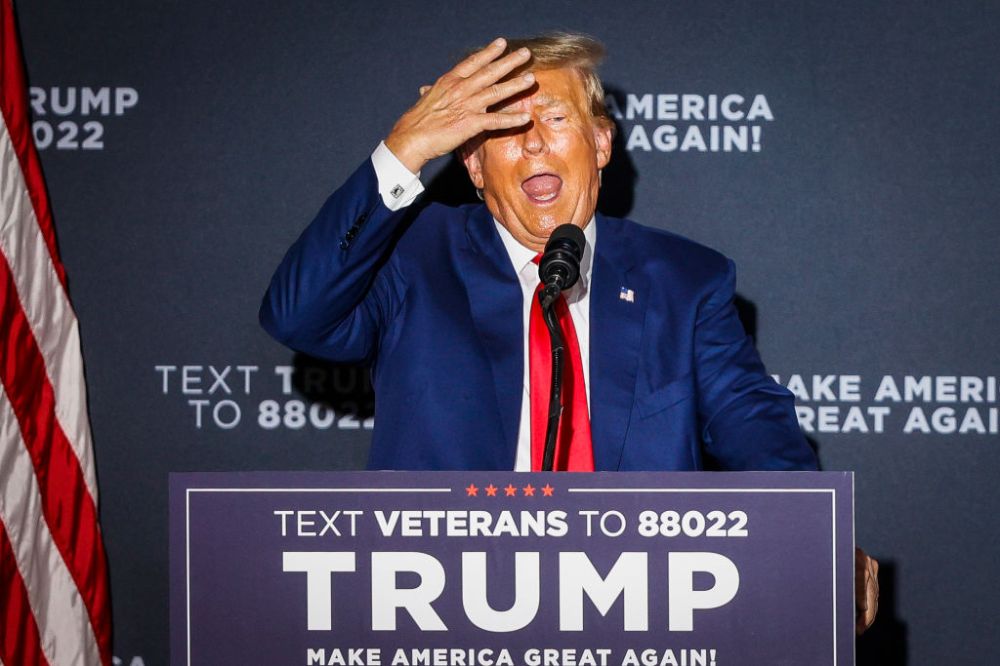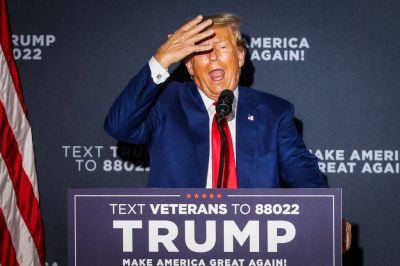If you’ve ever played chess with a little kid—or when you were a little kid (and not some mutant chess prodigy)—you probably know that kiddie chess is played one move at a time. What I mean is that little kids tend not to think very far ahead. My castle threatens Timmy’s queen, so Timmy moves his queen out of the way without thinking about what that means for my next move. It’s all in the moment.
Contrary to a lot of the early Trump boosterism about him being a 3-, 4-, or 11-dimensional chess player, this is how Trump argues—and lives!—most of the time. When he is challenged in the moment, he responds in the moment without much concern about the problems he might be creating for himself down the line. And because many of his defenders think that if Trump says something, it either must be true or it must be repeated as if it were true, they often echo his defenses without realizing what they’re conceding.
Defending yourself into a hole.
This is why, when arguing with Trump diehards, one of my favorite tactics is to agree with them. For instance, one of Trump’s early claims in the Mar-a-Lago documents scandal was that he declassified everything so it was okay for him to do whatever he wanted with the documents. So my response was, “Okay, let’s say that’s true.” That’s a colorable defense of the charge he broke the law, but it is an absolutely damning indictment of Trump’s judgment.
While overclassification is a real problem, nobody disputes that some things actually need to be classified. In other words, we classify some stuff because it should be kept secret. It’s not secret just because it’s classified. You put your most precious items in a safe because they are precious; they are not precious because you put them in a safe. It’s amazing how many people get confused about which way the causal arrows point.
So, let’s say Trump declassified a military plan of attack on Iran—he didn’t, and we have a tape of him saying he didn’t, while waving it around! But again, let’s say he did. No normal human with rudimentary cognitive abilities thinks our contingency plans for war with Iran should be prematurely declassified for pretty much any reason. But declassifying them solely so Trump can show off to sycophants and supplicants at Mar-a-Lago is a particularly idiotic reason. And this was essentially Trump’s defense. If people believed it, it would get him off the hook for breaking the law, while conceding that he was a complete moron. Surely if Joe Biden went on TV and divulged the names of undercover operatives in China because he confused some memo with the Denny’s Early Bird Special menu, the same people defending Trump wouldn’t say it’s no big deal because the president can declassify whatever he wants.
So let’s move on to a current widespread defense of Trump with regard to the latest batch of indictments. A common refrain, from both unalloyed Trump defenders to good-faith critics of the latest indictments, is that Jack Smith will have to prove Trump’s “state of mind” to convict him of obstruction and defrauding the government. I don’t think this is as hard as some claim. Prosecutors prove the state of mind of defendants all the time. Or at least they prove it to the satisfaction of juries and judges, which are the only parties that matter here. Very few criminal defendants admit they intended to break the law—that’s what legal scholars often call “a confession”—and yet there are a good number of criminals in jail. You could look it up. But I’m not a lawyer, and many smart lawyers say there are unique challenges to Smith’s case.
Regardless, let’s say the defenders are right. Trump believed the election was stolen and because he believed it, he can’t be convicted of corruptly—i.e., intentionally—breaking the law. What does this say about the man?
Let’s review a few facts.
When Trump claimed that thousands of dead people voted in Georgia, the Georgia secretary of state told him the actual number was probably four. Trump didn’t mention at the time that his campaign had commissioned a study of the Georgia vote that had high confidence the number was closer to nine, with a maximum of 23.
When he claimed there were 205,000 more votes than voters in Pennsylvania, the acting attorney general and acting deputy attorney general told him that was untrue.
When Trump insisted that there had been an illicit vote dump in Detroit, Michigan, Attorney General William Barr told him that was false. Moreover, Trump’s Republican allies in Michigan, including the speaker of the House and the majority leader in the state Senate, said they looked into the claim and found it was bunk.
Trump said there had been tens of thousands of “double votes” in Nevada; the Nevada secretary of state and the Nevada Supreme Court investigated the claims and said there was no truth to them.
Trump claimed that more than 30,000 non-citizens voted in Arizona. Trump’s own campaign manager told him this was false, as did the speaker of the Arizona House, who was still a Trump supporter at the time.
Trump insisted that voting machines in these and other states had switched votes from Trump to Biden. Barr and the rest of DOJ leadership explained to him this was bogus. Recounts and audits confirmed this.
There were at least 63 lawsuits adjudicated by state and federal courts—many presided over by Trump-appointed judges. Not one found there were any irregularities, anomalies, or instances of fraud that would have changed the outcome of the election. Not one. Indeed, very few of the lawsuits brought by Trump even alleged sweeping fraud because they had no evidence of such fraud, and lawyers are reluctant to lie in court. As Smith’s indictment states:
State and federal courts—the neutral arbiters responsible for ensuring the fair and even-handed administration of election laws—rejected every outcome-determinative post-election lawsuit filed by the Defendant, his coconspirators, and allies, providing the Defendant real-time notice that his allegations were meritless.
And the best defense that Trump and his praetorians can come up with is that he was so delusional, so narcissistically deranged, that he couldn’t let go of the belief that he won. And this is their defense.
Now, this isn’t entirely fair. Trump’s lawyers insist that he was relying on the advice of co-conspirators like John Eastman, Rudy Giuliani, and, to a lesser extent, Sidney Powell, to buttress his belief the election was stolen. But none of these people actually presented facts that could be corroborated. And even Trump thought Powell was coo-coo for Cocoa Puffs. As Rudy Giuliani said to Arizona House Speaker Rusty Bowers, “We’ve got lots of theories, we just don’t have the evidence.”
Barr told Trump to his face that investigations revealed that claims the election were stolen were, variously: “bullsh-t,” “completely bullsh-t,” “absolute rubbish,” “idiotic,” “bogus,” “stupid,” “crazy,” “crazy stuff,” “complete nonsense,” and “a great, great disservice to the country.” But it was only when Barr told the Associated Press that, despite extensive investigations by the FBI and U.S. attorneys, “to date, we have not seen fraud on a scale that could have effected a different outcome in the election” that Trump got really mad, because telling Trump he’s full of it in private is tolerable, but telling the public that his lies are garbage is outrageous. Trump called Barr into the Oval Office and asked him if he really said that to the AP. Barr said yes. And Trump responded, “You must really hate Trump.”
If Trump’s superfans could get their heads out of Trump’s posterior for a moment, these facts would tell them everything they need to know about how unfit for office the man is. Over and over again, he was told that he was wrong about the election being stolen by authoritative people with facts, data, and the means of investigating the truth. But because no credible person or institution—including people on his payroll—was willing to tell him what he wanted to hear, Trump kept scrounging for people willing to corroborate his delusions. And when these people told the public his theories were false, thus undermining his effort to steal the election (which was always the plan), he was furious that loyalty to the truth and the country would take precedence over loyalty to him.
Again, this is a defense?
Okay, maybe it is—as a legal matter. But it’s an incredibly damning indictment of him as a presidential contender—and a human being.
It’s not the best analogy, but remember how David Berkowitz (aka “Son of Sam”) claimed that a demon took the form of his neighbor’s dog and told him to murder people? It’s one thing to argue that Berkowitz’s claim—which he later admitted was bogus—was a plausible insanity defense. But only an idiot would say it’s any other kind of defense. Do people really want a commander in chief who responds to inconvenient facts from his own lieutenants with denial and outrage on the level of a Downfall parody?
“Sir, it turns out your friendship with Kim Jong-un was a subterfuge, he’s fueling his missiles.”
“You must hate Trump. Get me Steve Bannon. He knows Kim loves me.”
Now, I think Trump is unwell, unfit, and double-plus ungood in all manner of ways. But I don’t think he’s actually crazy—or “neurodivergent,” if you prefer. Trump is a master of deluding the public—or at least the slice of the public that wants to be deluded by him—by first deluding himself.
Like George Costanza saying, “It’s not a lie if you believe it,” he’s very skilled at pretending anything that benefits him is true. This is the guy who said his net worth depends on how he feels about himself. He’s the dude who convinced himself he knew Vladimir Putin because they were both on the same episode of 60 Minutes—in different segments. “I got to know him very well because we were both on 60 Minutes, we were stablemates,” he said in a 2015 debate. Then referencing the episode’s ratings (of course), he said. “We did well that night.”
But he hadn’t met Putin. The interviews were conducted on different continents at different times. I was once on Turner Classic Movies to talk about Mr. Smith Goes to Washington. I have not, however, met James Stewart. And if I claimed I had, you wouldn’t say, “Goldberg for president.”
I could go on forever. This is the guy who bragged that women are really into it when he grabs them by their privates because he’s a celebrity. This is the guy who—I think sincerely—believes that he’s a kind of super genius savant because he passed the basic test for cognitive impairment. Apparently, only Einstein and Trump’s nuclear physicist uncle could possibly repeat back, “Person, woman, man, camera, TV” after a few minutes of light conversation.
You get the point. Some of this stuff is just shameless lying. Some of it is Costanza-like self-delusion. None of it is a defense, not least of trying to steal an election.







Please note that we at The Dispatch hold ourselves, our work, and our commenters to a higher standard than other places on the internet. We welcome comments that foster genuine debate or discussion—including comments critical of us or our work—but responses that include ad hominem attacks on fellow Dispatch members or are intended to stoke fear and anger may be moderated.
With your membership, you only have the ability to comment on The Morning Dispatch articles. Consider upgrading to join the conversation everywhere.